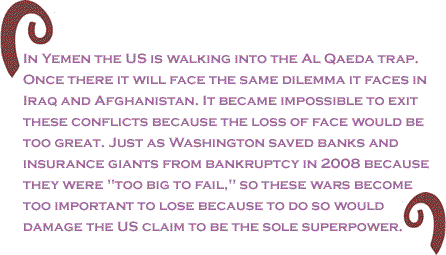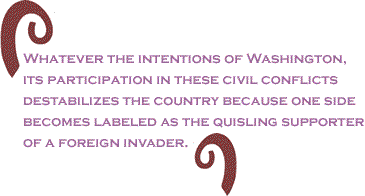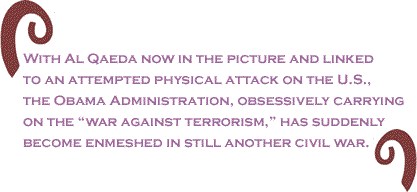
|
||||||||||||||||||||||
|
||||
 |
||||
It was one of those strange coincidences. First, there are news reports about the involvement of Saudi Arabia in attacking tribal rebels along the Saudi-Yemen border. Then, a young Nigerian somewhat mysteriously eludes security and tries to blow up and airliner heading into Detroit and it is said he was trained and equipped in Yemen. Next, the U.S. is bombing elements of Al Qaeda in Yemen. Undeniably it was a fortunate turn of events for the regime in Sana�a faced as it has been for some time with a separatist campaign in the south of the country and a growing insurgency in the north, both of which are domestic movements and not directed at the U.S. or any other foreign country. One thing is clear. With Al Qaeda now in the picture and linked to an attempted physical attack on the U.S., the Obama Administration, obsessively carrying on the �war against terrorism,� has suddenly become enmeshed in still another civil war. That entanglement could last a long time and involve all kinds of consequences. And, don�t think the U.S. just suddenly stumbled into the situation. Back in May, New York Times correspondent Robert Worth reported that the unrest in the country had �prompted an unusual statement of concern� (unrelated to any threat from Al Qaeda) by the U.S �affirming American support for a unified Yemen and urging all parties to �engage in dialogue to identify and address legitimate grievances.�� That message was delivered last Saturday in person by Gen. David Petraeus, the U.S. military commander responsible for the Middle East, following which the Times noted that the Yemeni regime �is battling separatist movements and is eager to have the use of American technology�� Now the people at the Times apparently aren�t reading their own back issues and go on blithely reporting as if that history has only just begun and it�s pretty much all about Al Qaeda. �The most recent round of violence began last Tuesday, when government troops established an additional checkpoint in the town of Radfan, in the southern Lahij Province,� Worth wrote May 4, 2009. �Angry local men attacked the checkpoint, killing two soldiers and injuring others. In the days since, demonstrations and violence have broken out in other towns, with three people killed in gun battles on Sunday. �In recent weeks, a number of political figures have begun openly demanding independence for the formerly socialist south, which was autonomous until the two Yemen�s unified in 1990. A brief civil war in 1994 left many southerners resentful of the north, and in the past three years grievances have steadily grown. These have been fueled mostly by economic disparities and the demands of retired southern soldiers who said they had not been paid their pensions.� �Yemen has all the explosive ingredients of Lebanon, Somalia, Iraq and Afghanistan,� Patrick Coburn wrote in The Independent (UK) last week. �But the arch-hawk Senator Joe Lieberman, chairman of the Senate Committee on Homeland Security, was happily confirming this week that the Green Berets and the US Special Forces are already there. He cited with approval an American official in Sana�a as telling him that, �Iraq was yesterday's war. Afghanistan is today's war. If you don't act pre-emptively Yemen will be tomorrow's war.� In practice pre-emptive strikes are likely to bring a US military entanglement in Yemen even closer.�
�The US will get entangled because the Yemeni government will want to manipulate US action in its own interests and to preserve its wilting authority,� Coburn went on.� �It has long been trying to portray the Shia rebels in north Yemen as Iranian cats-paws in order to secure American and Saudi support. Al Qaeda in the Arabian Peninsula (AQAP) probably only has a few hundred activists in Yemen, but the government of long time Yemeni President Ali Abdulah Salih will portray his diverse opponents as somehow linked to Al Qaeda. �In Yemen the US will be intervening on one side in a country which is always in danger of sliding into a civil war. This has happened before. In Iraq the US was the supporter of the Shia Arabs and Kurds against the Sunni Arabs. In Afghanistan it is the ally of the Tajiks, Uzbeks and Hazara against the Pashtun community. Whatever the intentions of Washington, its participation in these civil conflicts destabilizes the country because one side becomes labeled as the quisling supporter of a foreign invader. Communal and nationalist antipathies combine to create a lethal blend.� Coburn didn�t delve into the long history and U.S. involvement in Yemen and its collusion with Saudi Arabia in trying to shape events in that country.� Actually, it�s only the latest in the on-going saga that began during the Cold War. Washington and Riyadh team up to crush any left, secular or socialist movement or government, the Saudis provide the money, the U.S. comes through with arms, military training and logistical support and desperate or religiously driven young men are recruited for what they are told is holy war.
In 1990, President Ali Abdullah Salish presided over the Arab League arranged union of North Yemen and the PDRY.� At the time the latter faced a situation similar to that of Cuba following the collapse of the Communist USSR. Salih �also welcomed tens of thousands of Arab fighters returning from the jihad against the Soviet Union in Afghanistan, many of whom had been barred from returning to their home countries,� wrote Worth. �Four years later, when a brief civil war broke out, Mr. Sale sent those Islamist warriors to fight against the more secular south.� For the mujahedeen returning from Afghanistan in the early 1990s, the suppression of the godless South Yemeni was a logical continuation of their victorious war against the Soviets in the Hindu Kush,� wrote Yassin Musharbash, Volker Windfuhr and Bernhard this week in Spiegel (Germany). �Even today, Afghanistan veterans have ties that reach as far as President Saleh's innermost circle. Sheik Abdulmajid al-Zindani, known as the "red sheik," is a former associate of bin Laden and is one of the most powerful people in Yemen.�
�That was the start of a pragmatic relationship with the militants that would come to trouble Mr. Salih�s alliance with the United States.� wrote Worth in the Times. �After the Sept. 11 terrorist attacks, fearing that Yemen could become the target of an American invasion, he flew to Washington and promised President Bush that he would cooperate in the fight against terrorism. He rounded up thousands of jihadists who had fought in Afghanistan, and since then Yemen�s new elite American-trained counterterrorism forces have captured and killed a number of militants.� At the same time, the Yemeni president angered his U.S. benefactors by refusing to go after, or pardoning, individuals deemed terrorists with who we had political ties. Like Afghanistan President Hamid Karzai he would resort to charging interference if pressed to hard from Washington. The Shiite Houthi rebellion in the north of country grew stronger last year �and reached the margins of the capital.� wrote Worth. �Now that policy of divide and rule appears to have run beyond his control. Some current and former government officials say the rebels have struck humiliating blows,� he continued. �They have gained support among Yemeni tribes, and have bought weapons from the Yemeni military, which is said to have suffered desertions. Enter al-Qaeda We
often see Yemen � like Afghanistan � referred to as �a desperately
poor country.� According to the Observer (UK), the alleged underwear bomber Umar Farouk Abdulmutallab is said to have received Al-Qaida training at a camp run by Al Qaeda in the Arabian Peninsula, which has claimed responsibility for the failed attack, saying it was in retaliation for the US military support to the Yemen government. �But disentangling a hostile local population from the Al Qaeda fighters and leaders who have infiltrated the region will be a hugely difficult task,� said the newspaper. �Senior Yemeni officials told the Observer that Al Qaeda had been successful at buying the loyalty of local people.� �No one gets recruited free of charge. Al-Qaida come with resources to pay people,� said Abdel Karim Aryani, an adviser to President Ali Abdullah Saleh. "The religious appeal helps, but poverty is at the root of all Yemen's problems, including Al Qaeda."
Speaking to the Observer, the commander of Yemen's British- and US-trained counter-terrorism forces warned of the difficulties of attacking al-Qaida where it is hosted by local tribes. "Al Qaeda touch on very sensitive issues in tribal areas. They come in the name of God and religion and talk about Palestine and the occupation of Iraq and people sympathize with them," "What we are seeing is a pattern of franchises for Al Qaeda opening up," Riad Kahwaji, a Gulf security analyst in Dubai, told Aljazeera. "These groups are emerging in these countries, operating on a common strategy which is: to engage the US and its allies in Europe and in the region, to open various fronts simultaneously - or one after the other - in a way to keep the US and their allies off balance," he said. "It's a war of attrition." �It is extraordinary to see the US begin to make the same mistakes in Yemen as it previously made in Afghanistan and Iraq,� wrote Coburn. �What it is doing is much to Al Qaeda advantage. The real strength of Al Qaeda is not that it can �train� a fanatical Nigerian student to sew explosives into his underpants, but that it can provoke an exaggerated US response to every botched attack. Al Qaeda leaders openly admitted at the time of 9/11 that the aim of such operations is to provoke the US into direct military intervention in Muslim countries. �In Yemen the US is walking into the Al Qaeda trap. Once there it will face the same dilemma it faces in Iraq and Afghanistan. It became impossible to exit these conflicts because the loss of face would be too great. Just as Washington saved banks and insurance giants from bankruptcy in 2008 because they were "too big to fail," so these wars become too important to lose because to do so would damage the US claim to be the sole superpower.
�In Iraq the US is getting out more easily than seemed likely at one stage because Washington has persuaded Americans that they won a non-existent success. The ultimate US exit from Afghanistan may eventually be along very similar lines. But the danger of claiming spurious victories is that such distortions of history make it impossible for the US to learn from past mistakes and instead it repeats them by fresh interventions in countries like Yemen.� �Preventing terrorist attacks on the U.S. homeland has nothing to do with occupying vast tracts of land or winning the hearts and minds of backward villagers whom we falsely depict as surrogates of an evil empire, as we did in Vietnam and are now doing in Afghanistan,� wrote Robert Scheer in truthdig.com last week. �What is needed is smart police work to catch these highly mobile fanatics, and that begins with actually reading and then acting on the readily available intelligence data. It requires detectives with brains and not generals with firepower. �The ballooning of the defense budget after 9/11 has proved a great boondoggle for the military-industrial complex, which suddenly found an excuse to build weapons and deploy conventional forces against a superpower enemy that no longer exists. But our stealth fighters and bombers designed to defeat Soviet defenses that were never built are a poor match against a terrorist�s stealth underwear.� BlackCommentator.com Editorial Board member Carl Bloice is a writer in San Francisco, a member of the National Coordinating Committee of the Committees of Correspondence for Democracy and Socialism and formerly worked for a healthcare union. Click here to contact Mr. Bloice. |
||||
 |
||||
If you would like to comment on this article, please do so below. There is a 400 character limit. You do not need a FaceBook account. Your comment will be posted here on BC instantly. Thanks. Entering your email address is not mandatory. You may also choose to enter only your first name and your location.
|
||||
Thank you very much for your readership. |
||||
| Any BlackCommentator.com article may be re-printed so long as it is re-printed in its entirety and full credit given to the author and www.BlackCommentator.com. If the re-print is on the Internet we additionally request a link back to the original piece on our Website. | ||||
| |
||||
Issue 357 |
| Executive Editor: Bill Fletcher, Jr. |
| Managing Editor: Nancy Littlefield |
| Publisher: Peter Gamble |
| Est. April 5, 2002 |
| Printer Friendly Version in resizeable plain text format |
 |
 |

|
 |
| |
| |
















































